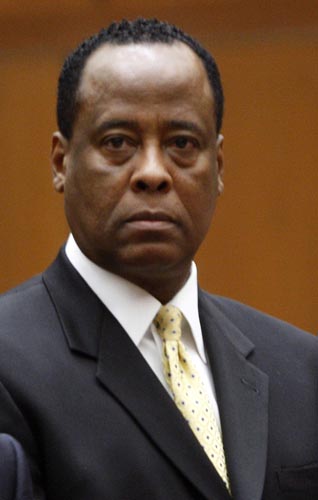No verdict over MJ doctor on 1st day deliberations
 0 Comment(s)
0 Comment(s) Print
Print E-mail
Xinhua, November 7, 2011
E-mail
Xinhua, November 7, 2011

A Los Angeles Superior Court jury wrapped up its first day of deliberations during the involuntary manslaughter trial of Michael Jackon's personal physician Conrad Murray on Friday, but it did not come up with any verdict regarding his fate.
Members of a seven-man, five-woman jury spent nearly six hours behind closed doors, deliberating the case stemming from Jackon's June 25, 2009 death. But they left the court for the weekend without reaching any verdict.
Prosecutors seek to prove Murray had failed to properly monitor Jackson after giving him a lethal dose of Propofol. They contended that the cardiologist "repeatedly acted with gross negligence, repeatedly denied appropriate care to his patient, Michael Jackson, and that it was Dr. Murray's repeated incompetence and unskilled acts that led to Mr. Jackson's death on June 25, 2009."
The Los Angeles County Coroner's Office ruled Jackson, who was in Los Angeles rehearsing for a soldout series of 50 concerts in O2 Arena in London dubbed "This Is It," died from acute Propofol intoxication.
When delivering closing argument Thursday, Deputy District Attorney David Walgren called Murray's treatment of the pop icon "unethical, unconscionable, and an extreme deviation from the standard of care." He said Murray demonstrated "consciousness of guilt" by failing to tell paramedics and emergency room doctors that he had given the singer the potent drug.
The former doctor only told the police about the anesthetic two days later because he thought investigators had already found the medication at the singer's rented Holmby Hills mansion,according to Walgren.
Defense attorneys argued Murray, who was hired by Jackson to care for him two months before his death, was weaning Jackson off the medication.
Defense attorney Edward Chernoff, in a impassionate rambling of closing argument on Thursday, said the prosecution lacked the proof that Murray had set up a Propofol drip the day the singer died, which in turn failed to hold Murray accountable for Jackson's death.
The case was officially submitted to the panelists late Thursday. The 12 jurors will consider the case when they return on Monday.
Murray, who is set free on a bail of 75,000 U.S. dollars, faces up to four years in prison and the loss of his medical licenses if convicted of the felony charge.





